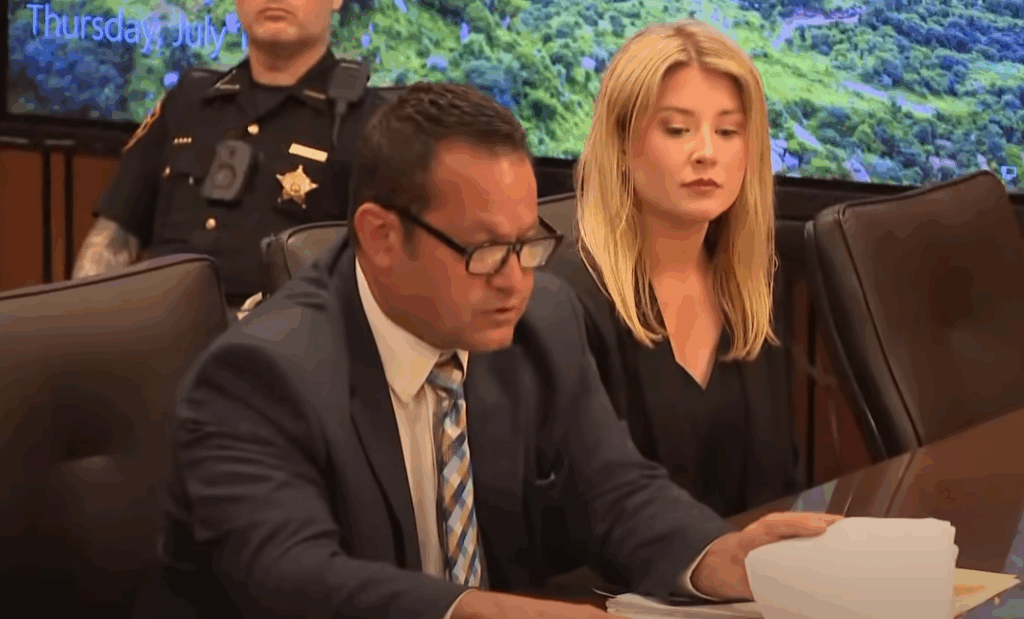Cuyahoga County, Ohio — In a case that blended elements of a toxic relationship with legal consequences, a former elementary school teacher has been sentenced to 18 months of community control and mental health treatment after pleading guilty to multiple misdemeanors involving her ex-boyfriend. The sentencing took place this week in the Cuyahoga County Court of Common Pleas.
A Complicated Case of Love, Law, and Boundaries
The defendant, Hannah Freeman, 27, appeared in court alongside her attorney, Michael Kinlin, for sentencing in Case No. 697119. Assistant County Prosecutor Patrick White appeared on behalf of the state. Freeman, a former fourth-grade teacher with a master’s degree, previously pleaded guilty in June to three charges:
- Disorderly conduct, a minor misdemeanor;
- Obstructing official business, a second-degree misdemeanor;
- Possessing criminal tools, a first-degree misdemeanor.
The charges stemmed from a volatile romantic relationship between Freeman and the victim, identified in court as Mr. McKenzie. According to prosecutors, their relationship spanned from April to November 2024, during which Freeman repeatedly appeared at McKenzie’s workplace and engaged in conduct that caused him emotional distress. What might have seemed like a messy breakup between two adults ultimately escalated into a legal matter that played out in the courtroom.
The Pre-Sentence Investigation and Disputed Narrative
Before sentencing, the court reviewed a Pre-Sentence Investigation (PSI) that included a detailed account of Freeman’s behavior, much of it derived from police reports. Kinlin, however, challenged the accuracy of certain portions of the PSI, particularly allegations that Freeman had stalked McKenzie. He argued that the two were still involved romantically at the time of the alleged stalking, and that some of her appearances at his workplace had been by invitation.
One of the most striking pieces of evidence involved flock camera license plate data, which showed Freeman’s vehicle appearing on West Lake City School property 33 times over 19 days during a 30-day period, including as late as November 7 at 4:07 p.m. Prosecutors argued this pattern of behavior demonstrated persistent unwanted presence. Defense counsel countered that Freeman was frequently invited to the school to assist McKenzie with his classwork.
The Backpack Incident: A Flashpoint
A major flashpoint in the case was the allegation that Freeman took two backpacks containing laptops, car keys, and personal belongings belonging to McKenzie. The prosecutor’s office described this as part of a pattern of conduct intended to draw McKenzie back into her life. Kinlin offered a different account: on November 6, Freeman believed she was spending the night at McKenzie’s home, only to receive a text disinviting her at the last minute. Upon arriving and discovering another woman there, she acted impulsively, taking his book bag for about three minutes before attempting to return it. According to the defense, she was intercepted by police after McKenzie called them during this brief period.
“This wasn’t a planned theft,” Kinlin argued. “It was a moment of emotional reaction to a very personal betrayal. She returned the property almost immediately.”
Mental Health and Career Fallout
Prosecutor White acknowledged the complex nature of the relationship, calling it “toxic” and “mutually complicated.” He emphasized, however, that Freeman’s mental health issues were a significant factor. “It’s clear from the PSI and from the facts that Ms. Freeman has underlying mental health challenges,” he told the court. “She has already taken steps to address these issues, and we believe continued treatment is essential as part of community supervision.”
Freeman’s career also suffered a major blow. She lost her teaching position following her arrest, a fact her attorney highlighted as a devastating personal and professional consequence. Aside from a minor noise complaint several years earlier, Freeman had no prior criminal record.

Judge’s Remarks: “A Bizarre Breakup Between Two Professionals”
When it came time to deliver the sentence, the judge did not mince words. Describing the case as “a bizarre breakup between two professionals,” the judge noted that the PSI painted an unflattering picture of Freeman’s conduct. “You should have known the relationship was over,” the judge told her. “The facts show repeated boundary violations and troubling behavior.”
Freeman was sentenced to:
- 18 months of community control;
- 90 days of GPS monitoring;
- House arrest with work release privileges;
- Mandatory mental health counseling, focusing on boundary setting;
- Seven days in the county jail at the beginning of probation;
- A no-contact order with the victim.
Before the sentence was imposed, Freeman briefly addressed the court:
“I regret the incident. I definitely acted out of emotion, and I regret that decision I made that night. I will take the necessary steps not to be back.”
Tension Between the Defense and the Court
After sentencing, defense attorney Kinlin appeared to push back against the judge’s interpretation of the facts and suggested the possibility of withdrawing the plea. The judge firmly rejected this, pointing out that Kinlin had months to discuss sentencing expectations and had chosen not to do so.
“Sorry, your bad practice is not my problem,” the judge said pointedly. “You had every opportunity to discuss sentencing before entering the plea. You didn’t.”
This brief exchange highlighted the tension between plea negotiations and judicial discretion — a common issue in criminal proceedings where defense counsel and prosecutors reach a plea agreement but fail to secure a binding sentencing recommendation.
A Case That Blurs Personal and Legal Lines
This case illustrates how the breakdown of a romantic relationship can spill into the legal system in unpredictable ways. What began as an emotionally charged breakup became a legal matter involving surveillance data, theft allegations, and mental health evaluations. While Freeman avoided more serious felony charges through her plea deal, the conditions of her sentence reflect the court’s view that her actions required supervision, boundaries, and accountability.
The prosecutor’s office expressed satisfaction with the sentence, emphasizing its balance between accountability and treatment. Freeman’s attorney maintained that the negotiated plea was a fair resolution based on the facts.
As the courtroom emptied, the lasting image was not of a hardened criminal, but of a young woman whose personal boundaries blurred disastrously with legal ones — a cautionary tale about how personal conflicts can escalate into criminal cases.


